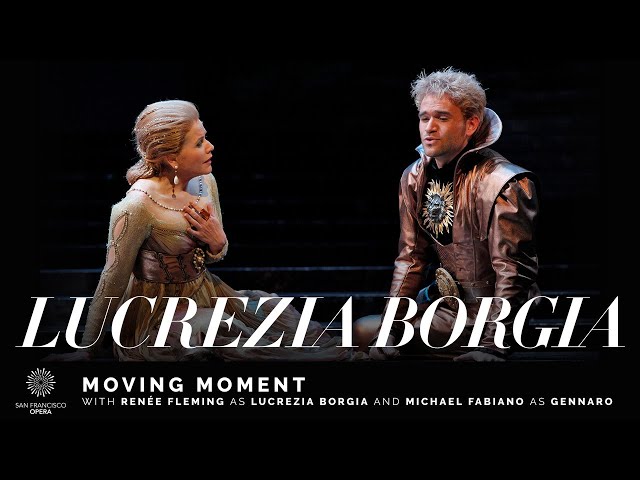LUCREZIA BORGIA San Francisco 2011 Renee Fleming, Michael Fabiano, Elizabeth DeShong
In this video
Lucrezia Borgia by Gaetano Donizetti
War Memorial Opera House, San Francisco, California
2011
CAST
Lucrezia Borgia: Renee Fleming,
Gennaro: Michael Fabiano,
Maffio Orsini: Elizabeth DeShong,
Duke Alfonso: Vitalij Kowljov,
Oloferno Vitellozzo: Brian Jagde,
Apostolo Gazella: Austin Kness
Ascanio Petrucci:Ao Li
Jeppo Liverotto: Christopher Jackson
Gubetta: Igor Vieira
Rustighello: Daniel Montenegro
Astolfo: Ryan Kuster
Princess Negroni:Blanche Hampton
Ladies of the Court: Mary Finch, Claire Kelm, Sally Mouzon, Sally Munro
Voice: Jere Torkelsen
Conductor:Riccardo Frizza
Orchestra of San Francisco Opera
Chorus of San Francisco Opera
Chorus Director: Ian Robertson
Stage Director: John Pascoe
Lighting Designer: Jeff Bruckerhoff
Choreographer: Lawrence Pech
===================================
Lucrezia Borgia is a melodramatic opera in a prologue and two acts by Gaetano Donizetti. Felice Romani wrote the Italian libretto after the play Lucrezia Borgia by Victor Hugo, in its turn after the legend of Lucrezia Borgia. Lucrezia Borgia was first performed on 26 December 1833 at La Scala, Milan.
Because of its scandalous subject matter, Lucrezia Borgia was taken up slowly in Italy and presented in many Italian theatres with altered titles and, in some cases, altered character names. It was given in Florence, beginning on 12 November 1838, as Eustorgia da Romano, in Trieste in the autumn of 1838 as Alfonso Duca di Ferrara, in Ferrara on 14 April 1841 as Giovanna I di Napoli, and in Rome on 26 December 1841 as Elisa da Fosco.
Synopsis

- Time: Early 16th century
- Place: Venice and Ferrara
Prologue
Scene 1
The Palazzo Grimani in Venice
Gennaro and his friends, including Orsini, celebrate on the brightly lit terrace, in front of which lies the Giudecca Canal (“Bella Venezia!”). The friends’ conversation turns to Don Alfonso, Duke of Ferrara, to whose house they will be travelling the next day, and to his wife, the infamous Lucrezia Borgia. On hearing Lucrezia’s name, Orsini tells of how Gennaro and he, alone in a forest, were warned by a mysterious old man to beware her and the entire Borgia family, and that the two of them would die together (“Nella fatal di Rimini“). Professing his boredom with Orsini’s tale Gennaro wanders off and falls asleep nearby. His friends are invited to rejoin the festivities, and he is left behind (“Senti! La danza invitaci”).
Scenes 2 and 3
A gondola appears, and from it a masked woman exits onto the terrace (“Tranquillo ei posa…”). She observes the sleeping Gennaro with affection and hurries over to him (“Com’è bello! Quale incanto in quel volto onesto e altero!”). When she kisses Gennaro’s hand, he wakes and is instantly struck by her beauty (“Leggiadra e amabil siete”). He expresses his love for her, but admits that the one person nearer to him is his mother that he has never met. He sings of his childhood as an orphan brought up by a common fisherman father (“Di pescatore ignobile esser figliuol credei”). The woman, sympathetic to his plight, weeps for him (“Ama tua madre, e tenero sempre per lei ti serba…”).
The others return (“Gente appressa… io ti lascio”) and seem to recognise her, listing in turn the members of their families she has killed, to Gennaro’s horror and disbelief (“Maffio Orsini, signora, son’io”). Gennaro is then finally told that the woman is Lucrezia Borgia.
Act 1
Ferrara
The Duke, believing Gennaro to be Lucrezia’s lover, plots his murder with his servant Rustighello (“Vieni: la mia vendetta è meditata e pronta”). Gennaro and his companions leave the house for a party and pass the Duke’s palace with its large gilded coat of arms reading Borgia. Keen to show his contempt for the Borgia family, Gennaro removes the initial “B”, leaving the obscene “Orgia” (orgy).
In the palace, Lucrezia is shown into the Duke’s chamber. Having seen the defaced crest, she demands death for the perpetrator, not knowing that it is Gennaro. The Duke orders Gennaro to be brought before her and accuses him of staining the noble name of Borgia, a crime to which he readily confesses. Lucrezia, horrified, attempts to excuse the insult as a youthful prank, but Don Alfonso accuses Lucrezia of infidelity, having observed her meeting with Gennaro in Venice. In a scene full of drama and tension, she denies any impropriety, but he demands the prisoner’s death and forces her to choose the manner of Gennaro’s execution. Pretending to pardon him, the Duke offers Gennaro a poisoned glass of wine, which he proceeds to drink. After a stunning trio (“Guai se ti sfugge un moto, se ti tradisce un detto!”) the Duke leaves and Lucrezia hurries to Gennaro, giving him an antidote to the poison the Duke has mixed with the wine. He drinks, and in a last duet, she implores him to flee the city and her husband (“Bevi e fuggi… te’n prego, o Gennaro!”).
Act 2
The palace of the Princess Negroni
Ignoring Lucrezia’s advice, Gennaro attends a party at the palace, swearing never to be parted from his friend Orsini. Orsini leads the party in a brindisi or drinking song (“Il segreto per esser felici”) and they drink. Lucrezia enters and announces that in revenge for their insults in Venice she has poisoned their wine and arranged five coffins for their bodies. She has hitherto believed that Gennaro fled Ferrara on her advice, and is thus dismayed when he steps forward and announces that she has poisoned a sixth. Orsini, Liverotto, Vitellozzo, Petrucci and Gazella fall dead. Gennaro seizes a dagger and attempts to kill Lucrezia, but she stops him by revealing that he is in fact her son. Once again she asks him to drink the antidote, but this time he refuses, choosing to die with his friends. In a final cabaletta (“Era desso il figlio mio”), Lucrezia mourns her son and expires.
Quoted from Wikipedia


























